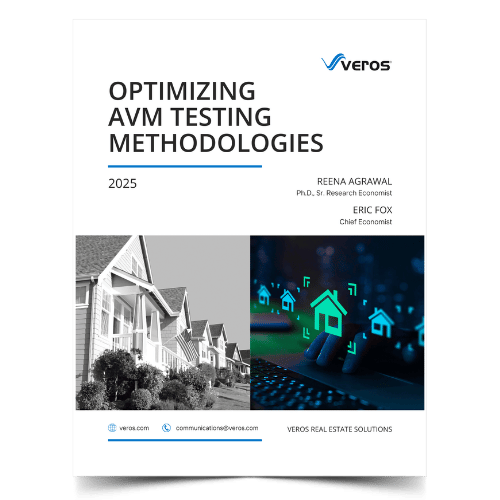Veros Real Estate Solutions (Veros®) appreciates everyone who has contributed to the growing conversation around automated valuation model (AVM) testing. The company’s recently released research paper, Optimizing AVM Testing Methodologies, and its recent webinar, A Critical Review of AVM Testing Methodologies, have generated substantial interest and dialogue on the important topic of appropriate AVM testing practices.
Veros has received considerable positive feedback from a wide range of industry stakeholders, including the nation’s largest lending institutions, credit unions, investors, guarantors, property valuation service providers, and AVM resellers. At the same time, some have offered alternative perspectives on the paper’s findings, and Veros welcomes their input. The company believes constructive dialogue strengthens AVM testing practices and enhances the real-world application of AVMs.
While Veros acknowledges counter perspectives provided in online responses and testimonials, the company holds the view that there are several important points to consider as the conversation moves forward.
Veros' Research is Grounded in Verifiable Data
The paper does not rest on a single, anecdotal example. Instead, its conclusions are built on multiple transparent, real-world analyses that consistently lead to the same findings. These examples have not been refuted or disproven in any way. Together, they provide a solid and reliable foundation for the paper’s conclusions, grounded in rigorous methodology and verifiable data.
Dr. Reena Agrawal, a Senior Research Economist at Veros conducted the research. Dr. Agrawal holds a Ph.D. in Economics from Vanderbilt University and an M.A. in Economics from The Ohio State University, and brings extensive expertise in economic research, quantitative and statistical analysis, and macroeconomic forecasting. Prior to joining Veros, Dr. Agrawal spent over a decade at Dun & Bradstreet, building deep industry experience.
Her analyses include a nationwide review of all Multiple Listing Sales (MLS) and list prices in Q3 2024, and a year-long study of identical model matches within a large master-planned community. These thorough and transparent examples underscore both the credibility of her findings and the strength of the paper’s conclusions.
Real-World Use Cases Are Essential
Veros emphasizes the critical importance of evaluating AVM performance in real-world use cases. To ensure accuracy and consistency, current purchase benchmark data must be used for purchase AVM performance testing, while current home equity lending and refinance data must be used for home equity and refinance AVM performance testing.
Using data from one use case to measure performance in another introduces incompatible benchmarks and leads to misleading results. Likewise, dated benchmark values compared to current values introduce non-real-world distorted performance results. Real-world AVM testing requires real-world use case data. A single one-size-fits-all testing approach fails to recognize the varying scenarios and conditions in which AVMs (and all property valuation services) are used. It may also raise questions about the validity, motivation, or available data sources of those who may advocate for this purported silver bullet approach, given that the real-world operates differently. It will likely lead to production results significantly different than expectations generated from misguided validations. Veros recommends a holistic approach to the validation and use of any property valuation service – an approach that matches validations with real-world use cases.
On the Topic of Independence
While AVM testing companies may assert their independence, no organization is entirely self-sustaining. Each firm is inherently connected to the data, models, or stakeholders it relies upon, creating unavoidable interdependencies. Consequently, true independence does not exist within AVM testing.
All industry participants maintain ties and potential conflicts of interest, whether as testing firms sourcing data from providers who also operate their own AVMs, or as AVM companies developing and marketing valuation models. Likewise, no company possesses complete knowledge of every aspect of the process. Every participant, including testing firms, AVM companies, and data providers, brings its own perspective, experience, and business interests.
This diversity of involvement is not a weakness but a natural reflection of the complexity of the industry. Recognizing that all parties have their own AVM business interests and no single entity holds an all-inclusive understanding of the AVM testing landscape highlights the importance of multiple perspectives in supporting sound AVM testing practices. For all stakeholders, transparency, full disclosure of any potential conflicts of interest, and a diversity of thought leadership are key. Veros has always focused on educating housing finance stakeholders on the appropriate use of AVMs and the pros and cons of any validation approach. To properly manage risk tolerance thresholds and meet regulatory expectations, users of any property valuation service must understand how these tools will perform in real-world production settings.
An Invitation to Read the Paper for Yourself
Veros welcomes all opinions of their recent AVM testing paper. They encourage all to read the paper directly and consider its relevance to your organization. Delve into the data and real-world examples provided, which illustrate critical risk decisions. If something doesn’t make sense or if there is an alternative view, let’s discuss it and work together to improve AVM performance testing! Veros discourages anyone from blindly accepting a single approach that does not align with real-world use cases.
Conclusion
There is broad industry agreement that AVM testing is a critical topic, and no single company has all the answers. That’s why Veros, along with other AVM companies, industry-leading lenders, and AVM testing organizations, are actively engaged in MISMO’s AVM Development Work Group. Together, they are working to identofy and establish AVM best practices in modeling transparency, confidence score measurements, and AVM performance testing for real-world scenarios.
To continue this important conversation, Veros will be hosting its next webinar, AVM Testing Methodologies: The Conversation Continues, in October 2025. The company encourages interested parties to attend the session. Webinar invitations and regsitration links will be available on Veros’ social media channels in the coming weeks.







